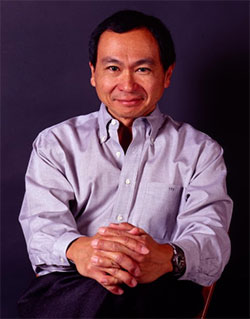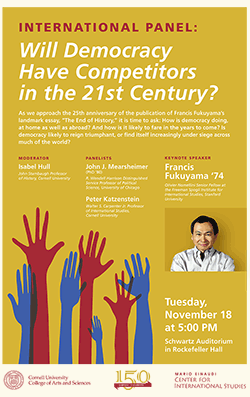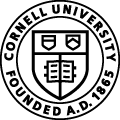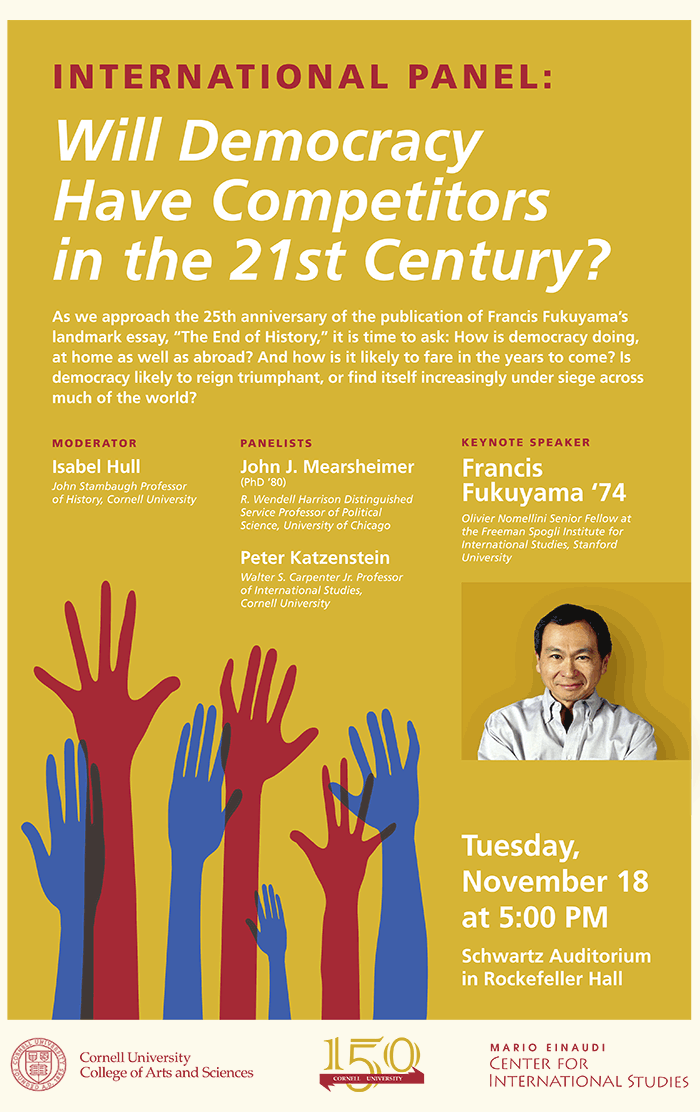
How is Democracy Doing?
A distinguished panel, with keynote speaker Francis Fukuyama, discussed how it is likely to fare in the years to come, and whether it will reign triumphant, or find itself increasingly under siege across much of the world.

The End of Democracy?
On Tuesday, November 18, 2014 at 5:00 PM in Schwartz Auditorium in Rockefeller Hall, celebrated public intellectual Francis Fukuyama '74 reflected on the 25th anniversary of his landmark essay, "The End of History," at an international panel. The Sesquicentennial event, "Will Democracy Have Competitors in the 21st Century?" will featured a keynote address by Fukuyama and responses from John Mearsheimer M.A. '78, Ph.D. '80 (University of Chicago) and Peter Katzenstein, W.S. Carpenter, Jr. Professor of International Studies. Isabel Hull, John Stambaugh Professor of History, served as moderator.
The panel considered the pressing questions of how democracy is doing, at home as well as abroad, how it is likely to fare in the years to come, and whether it will reign triumphant, or find itself increasingly under siege across much of the world.
Fukuyama is the Olivier Nomellini senior fellow at the Freeman Spogli Institute for International Studies, Stanford University. He was previously Bernard Schwartz Professor of International Political Economy at the School of Advanced International Studies (SAIS), John Hopkins University, and Hirst Professor of Public Policy at George Mason University. He has worked at the Rand Corporation and as a member of the Policy Planning Staff of the US Department of State.

Fukuyama received his B.A. from Cornell University in classics, and his Ph.D. from Harvard in Political Science. He has written widely on questions concerning democratization and international political economy. His 1992 book, "The End of History and the Last Man," has appeared in over 20 foreign editions. His latest book, "Political Order and Political Decay: From the Industrial Revolution to the Globalization of Democracy" was published in September 2014.
Mearsheimer, the R. Wendell Harrison Distinguished Service Professor of Political Science at the University of Chicago, is an international relations theorist, and the leading proponent of a branch of neorealist theory in international relations called offensive neorealism. He has written substantially on Ukraine, nuclear proliferation and nuclear deterrence, offensive neorealism, the Gulf War, the Palestinian-Israeli situation, the rise and containment of China, and lying in international politics. Mearsheimer received his B.S. from the United States Military Academy and his Ph.D. from Cornell University. He teaches at the University of Chicago, where he is also the co-director of the Program on International Security Policy. In 2003, he was elected to the American Academy of Arts and Sciences.

Katzenstein specializes in Asian (specifically Japanese) and European (particularly German) roles and norms in international relations. His primary concentration is in the study of culture, identity, religion, and regionalism in the interstate system. Katzenstein received his B.A. from Swarthmore College and his Ph.D. from Harvard University. He is a member of the Council on Foreign Relations, and in 2013 was recognized by the journal Foreign Affairs as a "renowned scholar of international relations."
The Nov. 18 event was co-sponsored by the College of Arts and Sciences and the Mario Einaudi Center for International Studies.


